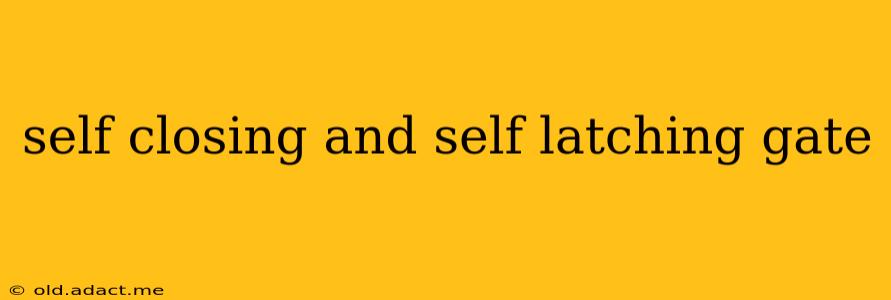Choosing the right gate for your property is crucial for safety and security. Self-closing and self-latching gates offer enhanced protection and convenience, but understanding their differences is key to making the right decision. This guide will explore the features, benefits, and considerations of both types, answering common questions to help you choose the best option for your needs.
What is a Self-Closing Gate?
A self-closing gate is designed to automatically close after it's opened. This feature is achieved through various mechanisms, including:
- Spring-loaded hinges: These hinges utilize a spring mechanism to gently pull the gate closed. The strength of the spring can often be adjusted to suit the weight of the gate and wind conditions.
- Hydraulic closers: These offer smoother, more controlled closing, often with adjustable closing speed. They are more durable and better suited for heavier gates.
- Pneumatic closers: Similar to hydraulic closers, these utilize compressed air for closing. They tend to be quieter than hydraulic closers.
The primary benefit of a self-closing gate is improved security. It prevents accidental entry and ensures the gate is always closed, deterring unauthorized access. It also adds convenience, eliminating the need to manually close the gate every time.
What is a Self-Latching Gate?
A self-latching gate automatically latches shut once it closes. This usually involves a latch mechanism that engages automatically when the gate is in the closed position. This mechanism can be:
- Magnetic latches: These offer a simple and quiet solution, ideal for lighter gates.
- Bolt latches: These provide a more robust and secure latching mechanism, suitable for heavier gates.
- Automatic locking mechanisms: These can integrate with other security systems for even greater security.
The main advantage of a self-latching gate is increased security. It prevents the gate from being left open unintentionally, offering an extra layer of protection against intruders.
What's the Difference Between Self-Closing and Self-Latching Gates?
The key difference lies in their function. A self-closing gate simply closes automatically, while a self-latching gate both closes and secures itself. You can have a gate that is self-closing and self-latching, offering the best of both worlds. However, a self-closing gate can still be left unlatched, and a self-latching gate may not close automatically if it's opened wider or forcefully.
Do Self-Closing Gates Need to be Self-Latching?
No, self-closing and self-latching are separate features. A gate can be self-closing without being self-latching, leaving it vulnerable if not manually latched. A self-latching gate doesn't necessarily need to be self-closing, although this combination provides optimal security.
What are the Benefits of Using Self-Closing and Self-Latching Gates?
Combining both features offers significant benefits:
- Enhanced Security: Prevents unauthorized access.
- Improved Safety: Reduces the risk of accidents, especially for children and pets.
- Convenience: Eliminates the need to manually close and latch the gate.
- Reduced Maintenance: Prevents gates from being left open and potentially damaged by wind or other elements.
What are the Different Types of Self-Closing and Self-Latching Mechanisms?
As mentioned earlier, various mechanisms achieve self-closing and self-latching functions. The best choice depends on the gate's weight, material, and the desired level of security. Consider factors like cost, maintenance requirements, and ease of installation when selecting a mechanism.
How Much Do Self-Closing and Self-Latching Gates Cost?
The cost varies widely depending on the size, material, and type of mechanism used. Simpler spring-loaded mechanisms are generally more affordable, while hydraulic or automatic locking systems will be more expensive. Installation costs should also be factored into the overall budget.
Where Can I Buy Self-Closing and Self-Latching Gates?
Self-closing and self-latching gates and their components are available from various suppliers including hardware stores, online retailers, and specialized gate companies. It’s advisable to consult with professionals for custom-designed gates and installations for more complex applications.
This comprehensive guide aims to provide valuable insights into self-closing and self-latching gates. Remember to consider your specific needs and budget when making your selection. Choosing the right gate can significantly enhance your property's safety and security.
